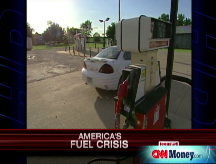Gasoline: Shaving off one tax at a time
In this time of high prices, the government is levying a tax on imported ethanol. Is it time for that tax to go?
NEW YORK (CNNMoney.com) -- Any idea intended to lower gasoline prices never fails to attract attention, but seldom does it garner anything near unanimous support.
Lifting the tariff on imported ethanol was the lone idea in a recent CNNMoney.com story about how to lower gas prices that had support from a variety of energy experts - a consumer rights advocate, an energy trader, and an academic.
But lifting the tariff will likely only lower gas prices by a dime a gallon, and the domestic ethanol industry argues it will leave the country dependent on yet another foreign energy source.
The import tariff of 54-cents a gallon on ethanol - a required component in gasoline - keeps the price of imported ethanol high. Much imported ethanol is made from sugarcane which is cheaper-to-produce than domestic corn-based ethanol.
The fact that the government has a tariff on any energy product in these times of high prices is illogical to some.
"We don't have a tariff on oil or natural gas or anything like that," said Bill Koetzle, an analyst at the Institute for Energy Research, a free market-leaning think tank. "It's old-fashioned protectionism."
If the tariff were lifted imports would likely grow, and that could cut ethanol prices by maybe $1 a gallon, said John Kilduff, an energy analyst at MF Global in New York.
But ethanol doesn't make up a huge portion of the U.S. gasoline supply. Out of about 150 billion gallons of gas used annually in the U.S., ethanol is projected to make up about 9 billion gallons of that this year. So Kilduff said gasoline prices might be reduced by maybe 10 cents a gallon.
Ethanol use is mandated to grow to 36 billion gallons by 2022, so the price drop in gasoline if the tariff is suspended could increase over time.
Defenders of the tariff say lifting it may result in some domestic ethanol producers going out of business, leaving the country open to greater reliance on foreign countries like Brazil.
"If we want energy security, we need to make sure ethanol facilities are built in the U.S.," said Arnie Klann, president of BlueFire Ethanol, an Irving, Calif.-based company focused on making ethanol from non-food crops.
The ethanol industry says the tariff isn't the issue behind high gas prices. They say ethanol is cheaper than gas and accuse refiners of not passing along the savings to consumers.
Ethanol is currently selling for $2.48 a gallon on the wholesale market, said Ron Lamberty, director of markets development for the American Coalition for Ethanol. Gasoline, said Lamberty, is nearly a dollar more.
"It means someone is marking it up a lot," said Lamberty about refiners, who he says have been loath to cede fossil fuel market share to plant-based products.
A spokesman for the National Petrochemical and Refiners Association said refiners were not unduly inflating the price, but rather marking it up to reflect the expenses involved in transporting and blending ethanol with gasoline. ![]()






